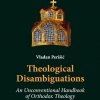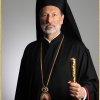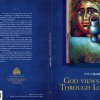An Unconventional Handbook of Orthodox Theology
by Rev. Vladan Perisic
Foreword
by Fr John Behr
It is a great pleasure to see this work published, making available some of the most important writings of Fr Vladan Perisic over the last couple of decades available, together in one volume, to an English speaking audience. Fr Vladan’s work is well known in Serbia, and in broader academic and ecumenical circles. But it can now receive the much wider readership that it deserves, and, as a collected volume, its scope, coherence, and significance is sure to receive the recognition it deserves.
The eighteen essays collected here treat diverse topics, from academic theology (and its place in the Church) to questions of life and death, from historically oriented studies, on Sts Ignatius and Gregory Palamas, to contemporary issues, such as human rights and ecology. Each of them is characterized by meticulous scholarship and great insight, clarity of thought and expression.
While treating diverse topics, there is nevertheless an underlying unifying approach, one that is captured well by the arresting title of this book: Theological Disambiguations. The title, of course, calls to mind the great (and dense) work of St Maximus the Confessor, the Ambigua. It is characteristic that this saint, the most profound theologian among the Fathers, does not attempt to construct an overarching edifice of systematic theology, as has become the practice over the last centuries, but rather explores particular theological points, taking his lead from difficult statements of St Gregory the Theologian, and in doing so leads the reader to a more expansive theological vision, in which the original point of difficulty becomes recontextualized and greater insight into the breadth and depths of the wisdom of God is attained. Fr Vladan’s approach is similar, taking various issues that have become problematic due to the modern polarization between faith and reason, and seeking to resolve the problematic by working carefully through the issues involved and finding a standpoint prior to the opposition, so opening out a more comprehensive horizon.
Of particular interest is Fr Vladan’s assertion that the proper context of Christian theology is philosophy. Much of late twentieth-century theology has been devoted to exploring the fact that all theology is necessarily contextual, for it is always—from the apostles and evangelists themselves to contemporary thinkers— articulated by historically, geographically, and sociologically situated human beings. Against the tendency to then re-contextualize theology within different anthropological, sociological, cultural, and political contexts, Fr Vladan argues, rightly, that the proper context for theology is in fact philosophy. While every theologian certainly thinks, speaks, and writes in a particular socio-political situation, the problems address, as theology, belong to a different realm. To use Fr Vladan’s image: the evangelist John, the "Theologian", asserts "The Word became flesh and dwelt among us" (Jn 1:14), not "the Word became a Jewish rabbi and dwelt in first-century Judea"; as true as the second statement is, it is not theology, whereas the first statement is properly theological, reflected upon intensely in the theological debates of the following centuries, concluding that the enfleshed Word defines for us both what it is to be God (he is consubstantial with the Father) and what it is to be human (he is consubstantial with us), in one, and as such is "the image of the invisible God" (Col. 1:15). After a couple of centuries of intense theological scholarship, which has resulted in the fragmentation of the discipline of theology into a variety of fields (Scriptural study, liturgical study, patristics, systematic reflection, etc.) that are often unable to understand each other, understanding the proper nature of theological discourse, as theology, is one of the most pressing contemporary issues. This "unconventional handbook" has much to offer, as we begin to learn again how to speak true theology.





